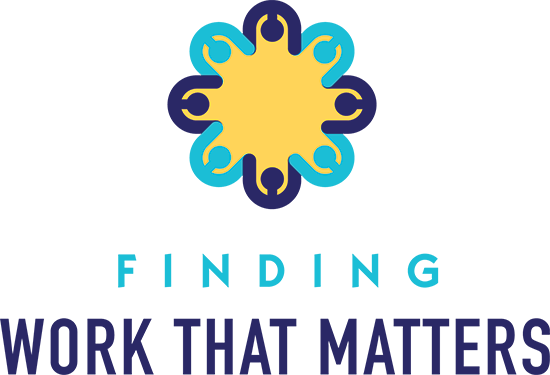How to find work that matters
/Welcome to the inaugural blog posting for Finding Work That Matters! I am excited about this new undertaking. Because work is an expression of who we are, I believe it is important to find the work that invigorates us! When we find the work that matters to us, we will do our best work, contribute the most and make a difference in others’ lives.
The way to find work that fits is not a straight path for many of us. Some people, like my son, found his passion when he was a teenager, so curious about the first computer that came into our house that he had to look inside. And like me, some of us stumble upon it. I was working as a payroll clerk across the hall from the education department. I was intrigued by the conversations coming out of that room; I was like a dog who perks up her ears when something captures their attention.
What I know about the process now from both my son and I is that curiosity was the connecting thread. The clues for your career will be rooted, too, in paying attention to what intrigues you, what continues to intrigue you and what has always intrigued you.
One of my key questions that followed my life as a career counsellor was, “What really works in finding our brilliant career?” I watched as people struggled with trying to figure this out on their own, as they questioned why they couldn’t be happy in the work they were doing since everybody else seemed happy, and their work felt – well, lifeless. “What was the point in it all?” they were asking.
As they told their stories, I heard deep questioning – Who am I? What am I meant to do? I heard them questioning themselves, feeling adrift, and on top of it all, an immense pressure to figure it out. Does this sound familiar to you?
When I started reading about career exploration, I saw that the experts were saying that the starting point was: Know yourself. It made sense. I could see the frustrations that people experienced by looking at the labour market demand or job positions and using that as a guide – inevitably a good deal of them became bored and disillusioned. To me, finding work that fits is an inside job. If we want to find work that is in alignment with who we are, we need to have a good idea of who we are.
In my work, I spent a lot of time considering how to find the right work fit. I studied models, completed assessments, read books and thought a lot. Then I created workshops and tried out my ideas on the participants. People were ready! Many never knew that there was a way to solve the problem. They were inspired, relieved, intrigued and grateful!
Over time and the experience of working with career explorers, I worked at the framework until it became the model that is the basis for Finding Work That Matters.
There are 8 segments that comprise the model. Each of those has an overriding question and intersect with each other to give a total picture.
The 8 segments are comprised of 3 main categories: The Leading Edge, Distinguishing Trademarks, and Discretionary Features.
The Leading Edge
The Leading Edge includes Personality Type and Strengths. These two components are what make us distinct and gives us an edge in the workplace. Both of these aspects of ourselves are what we are born with, how we are hardwired. They may appear to change but as we age and develop more self awareness, we become clearer about who we really are and we see that we have always had these particular strengths or personality type.
The Questions:
Personality Type: What energizes you?
Strengths: What makes you feel strong?
Distinguishing Trademarks
This category is comprised of Values, Vision, Meaningfulness, and Motivation. Through these components, we get a picture of what is most important to us, our beliefs, and our desires. All of these elements are a key part of the finding work that is a good fit for us. Depending our experience and situation, the elements in this section may change or be refined as we grow and change. As our circumstances change, we may find ourselves drifting to asking questions about values, vision, meaningfulness and motivation.
The Questions:
Values: What is most important to you?
Vision: What vision do you have of your life?
Meaningfulness: What is your greatest contribution to others?
Motivation: What drives you?
Discretionary Features
Skills and Passions are the two components that are in this category. I like to think of them like electives that we take in school – they enhance the process of work search but they are not the integral part. Skills are only important if they are what we want to do. We can be highly skilled but if we don’t like it, we will have a life of misery. We can always build on our skills and certainly many of our skills are transferrable. I believe that there is a best time in the process to look at skills and that is when we have chosen our careers and are developing the plan to make it happen.
Passions are important because they fuel us, but we may not get paid for doing them; some people don’t want to turn their passions into their profession because that may diminish their enjoyment. As a part of the career exploration process, passions are not a key element. They can provide an entry way into understanding what about that passion excites us.
The Questions:
Skills: What do you want to develop?
Passions: What enriches your life?
Now, I will turn this over to you. I am curious if you have found the work that you love. I would love to hear from you!


